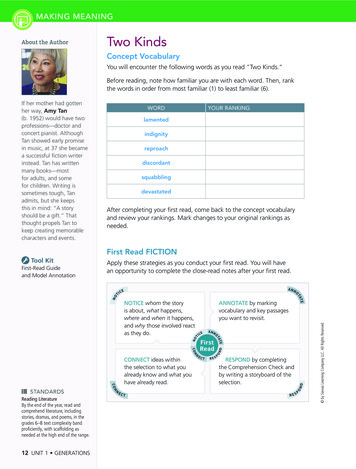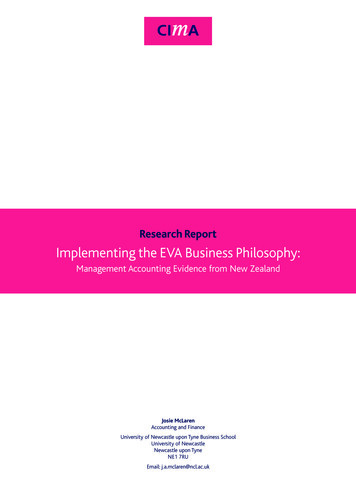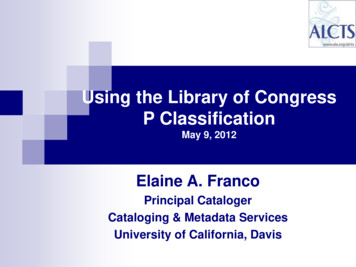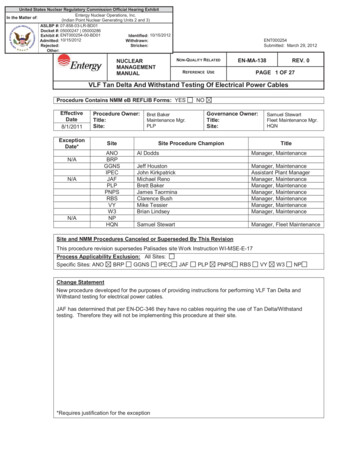
Transcription
Edward S. Boyden, Ph. D.Y. Eva Tan Professor in Neurotechnology at MITHoward Hughes Medical InstituteMcGovern InstituteProfessor, Departments of Brain and Cognitive Sciences, Media Arts and Sciences,and Biological Engineering, MITCo-Director, MIT Center for Neurobiological EngineeringMember, MIT Center for Environmental Health Sciences, Computational andSystems Biology Initiative, and Koch InstituteLeader, Synthetic Neurobiology GroupMassachusetts Institute of Technology77 Massachusetts Ave., Room 46-2171C, Cambridge, MA 02139email - edboyden@mit.eduphone - (617) 324-3085web - http://synthneuro.orgVisionMy group invents, and applies, technologies that enable the systematic mapping, analysis,and repair of the brain and other complex biological systems. Our philosophy is to try to bringthe observation and fixing of such complex systems to a “ground truth” level, so that we canunderstand and address the fundamental mechanisms of operation of these systems. We aredeveloping tools that enable molecular mapping of biological systems with nanoscaleprecision, recording of the high-speed molecular and signaling dynamics of brain circuits andother biological systems, and control of the electrical and signaling activity of brain cells usingnew molecular tools engaged by pulses of light. Ultimately we hope to create technologiesthat enable the correction of brain disorders and other complex diseases that affect almosteveryone, directly or indirectly, and to provide insights into how the brain generates thoughtsand feelings, essential to understanding the human condition.Researchand workactivitiesMassachusetts Institute of Technology, Cambridge, MA (July 2020-present)Y. Eva Tan Professor in Neurotechnology at MITHoward Hughes Medical Institute, InvestigatorFull Professor with Tenure, MIT Departments of Brain and Cognitive Sciences, Media Artsand Sciences, and Biological EngineeringInvestigator, MIT McGovern InstituteExtramural Member, MIT Koch Institute for Integrative Cancer ResearchLeader, Synthetic Neurobiology GroupCo-director, MIT Center for Neurobiological EngineeringInventing, and applying, tools for systematic analysis and engineering of the brain.Massachusetts Institute of Technology, Cambridge, MA (July 2019-June 2020)Y. Eva Tan Professor in Neurotechnology at MITFull Professor with Tenure, MIT Media Lab, MIT Departments of Biological Engineering andBrain and Cognitive SciencesInvestigator, MIT McGovern InstituteExtramural Member, MIT Koch Institute for Integrative Cancer ResearchLeader, Synthetic Neurobiology GroupCo-director, MIT Center for Neurobiological EngineeringInventing, and applying, tools for systematic analysis and engineering of the brain.Massachusetts Institute of Technology, Cambridge, MA (July 2014-Jun 2019)Y. Eva Tan Professor in Neurotechnology at MIT (2018-on)Associate Professor with Tenure, MIT Media Lab, MIT Departments of Biological Engineeringand Brain and Cognitive SciencesInvestigator, MIT McGovern InstituteExtramural Member, MIT Koch Institute for Integrative Cancer Research (2017-on)Leader, Synthetic Neurobiology GroupCo-director, MIT Center for Neurobiological EngineeringInventing, and applying, tools for systematic analysis and engineering of the brain.Massachusetts Institute of Technology, Cambridge, MA (Jan 2011-Jun 2014)Associate Professor, MIT Media Lab (Benesse Career Development Professor 2011-2013,AT&T Career Development Professor, 2013-2014), MIT Departments of BiologicalEngineering and Brain and Cognitive SciencesEdward S. Boyden, Ph. D.January 7, 20211
Investigator, MIT McGovern InstituteLeader, Synthetic Neurobiology GroupCo-director, MIT Center for Neurobiological Engineering (2013-on)Inventing tools for systematic analysis and engineering of the brain.Massachusetts Institute of Technology, Cambridge, MA (Jan 2007-Jan 2011)Assistant Professor, MIT Media Lab (Benesse Career Development Professor), MITDepartment of Biological Engineering (2007-on), MIT Department of Brain and CognitiveSciences (2008-on)Investigator, MIT McGovern Institute (2010-on)Leader, Synthetic Neurobiology GroupInventing tools for systematic analysis and engineering of the brain.Massachusetts Institute of Technology, Cambridge, MA (Nov 2006-Jan 2007)Visiting Scientist, MIT Media Lab; Leader, Neuroengineering and Neuromedia GroupInventing tools for systematic analysis and engineering of the brain.Stanford University, Stanford, CA (Oct 2005-Oct 2006)Helen Hay Whitney postdoctoral fellow, Depts. of Bioengineering, Applied Physics, BiologicalSciences, with Drs. Mark Schnitzer and Karl DeisserothInventing optical methods for accelerating neuroscience progress.Stanford University, Stanford, CA (Sep 1999-Oct 2005)Hertz predoctoral fellow, NIH NRSA predoctoral fellow, Program in Neurosciences, Depts. ofMolecular and Cellular Physiology and Neurobiology, with Drs. Jennifer Raymond andRichard Tsien.Studied how neural circuits selectively engage plasticity to store specific memories.Co-developed optogenetics (an independent side collaboration, parallel to PhD work).Bell Labs, Lucent Technologies, Murray Hill, NJ (1998-99)Research assistant, with Drs. Sebastian Seung and Michale Fee.Created an elementary phase-resetting model of birdsong stochasticity.Helped implement active electrode stabilizer for neural recordings in awake animals.Massachusetts Institute of Technology, MIT Media Lab, Cambridge, MA (1998-99)Graduate research, with Dr. Neil Gershenfeld.Design and fabrication of prototype nuclear magnetic resonance (NMR) quantum computer.Engineered control software for the MIT ORCA-1 autonomous submarine.Designed hardware for a MEMS accelerometer using electron-tunneling.Massachusetts Institute of Technology, MIT Media Lab, Cambridge, MA (1996-98)Research assistant, with Dr. Neil Gershenfeld.Programmed machine-learning tools for reconstructing dynamics of a digital violin.Created 3D, non-contact interactive design program based on electric field imaging of hands.Activision, Inc., Santa Monica, CA (1997)Research programmerDesigned real-time, physics-based animation engine for video games.University of North Texas Chemistry Department, Denton, TX (1994-95)Research assistant, with Dr. Paul BratermanResearch on the origins of life; synthesized and analyzed layered double hydroxides withintercalated anions.EducationStanford University, Stanford, CA (1999-2005)GPA: 4.1/4.0PhD, NeurosciencesThesis title: Task-specific neural mechanisms of memory encodingAdvisors: Drs. Jennifer Raymond and Richard Tsien.Edward S. Boyden, Ph. D.January 7, 20212
Massachusetts Institute of Technology, Cambridge, MA (1995-99)GPA: 5.0/5.0M.Eng., Electrical Engineering and Computer ScienceB.S., Electrical Engineering and Computer ScienceB.S., PhysicsThesis title: Quantum Computation: Theory and ImplementationAdvisor: Dr. Neil GershenfeldTexas Academy of Mathematics and Science, University of North Texas, Denton, TX(1993-95)GPA: 4.0/4.0Majorawards andhonorsInternational prizes and honors:2020, Wilhelm Exner Medal2019, Lennart Nilsson Award2019, Croonian Medal2019, Warren Alpert Foundation Prize2019, Rumford Prize2018, Canada Gairdner International Award2016, Breakthrough Prize in Life Sciences2015, BBVA Foundation Frontiers of Knowledge Award2015, Carnegie Prize in Mind and Brain Sciences2013, Jacob Heskel Gabbay Award2013, Grete Lundbeck European Brain Research Prize (“The Brain Prize”)2011, Perl/UNC Neuroscience PrizeHonorary memberships:2019, National Academy of Sciences, elected member2017, American Institute for Medical and Biological Engineering (AIMBE) College of Fellows,elected member2017, National Academy of Inventors, elected member2017, American Academy of Arts and Sciences, elected memberHonorary grant awards and positions:2020, Howard Hughes Medical Institute, Investigator2017, 2013, 2012, NIH Director’s Transformative Research Award2016, Howard Hughes Medical Institute Simons Faculty Scholar2013, NIH Director's Pioneer Award2011, New York Stem Cell Foundation-Robertson Investigator Award2011, NSF CAREER Award2011, A F Harvey Prize2010, Paul Allen Distinguished Investigator Award in Neuroscience2008, NARSAD Young Investigator Award2008, Alfred P. Sloan Research Fellowship2007, NIH Director’s New Innovator Award2007, Wallace H. Coulter Foundation Early Career Translational Research Award inBiomedical EngineeringJunior investigator prizes and awards:2018, Blavatnik National Award for Young Scientists, Life Sciences, Finalist2015, Society for Neuroscience Young Investigator Award2014, Schuetze Award in Neuroscience2006, Technology Review TR35, World’s Top 35 Innovators under Age 35Other awards and honors:2018, Charles C. Shepard Award, Laboratory Science, Centers for Disease Control2018, Larry J. Anderson Award for Outstanding Public Health Service, Centers for DiseaseControl, National Center for Immunization and Respiratory Diseases2017, Drexel Prize in Biotechnology2017, The Scientist: Top Technical Advances in 2017 (robotic image-guided patch clamping)Edward S. Boyden, Ph. D.January 7, 20213
2017, Nature Methods Method to Watch (Expansion Microscopy)2016, TED Summit, Invited Speaker2016, Boston Globe, 2016 Game Changers2014, Academy of Achievement, Delegate2013, 10 Life Science Superstars 40 and Under, Genetic Engineering & Biotechnology News2013, World Economic Forum, Young Scientist2012, Wired, “Smart List 2012: 50 People Who Will Change the World”2011, TED, Invited Speaker2010, Nature Methods Method of the Year (Optogenetics)2010, Eppendorf and Science Prize for Neurobiology, Finalist2007, Society for Neuroscience, Research Award for Innovation in Neuroscience (RAIN)2006, Fannie and John Hertz Foundation, Top Ph.D. Thesis Prize2005, Helen Hay Whitney Fellowship2004, Dan David Prize Scholarship (Future Dimension, Brain Sciences)1999, Fannie and John Hertz Fellowship1998, International Autonomous Underwater Vehicle Competition, 1st placeNamed lectureships and keynotes (selected; full list at end)2020, Neuronexus Neurotechnologies Symposium, keynote. (virtual)2020, Keynote, Optogenetics and Optical Manipulation 2020, SPIE Photonics West, SanFrancisco, CA.2020, Keynote, 18th International Symposium on Neural Regeneration, Asilomar, California.2019, Gurley Lecture, UC Santa Barbara.2019, Optogenetic Technologies and Applications, AIChE / Society for Biological Engineering,Boston MA, keynote2019, Fredric S. Fay Memorial Lecture, U Mass Medical2019, Britton Chance Lecture for Advances in Basic Imaging Research, World MolecularImaging Congress, Montreal, Canada.2019, Keynote, OptoDBS, Geneva.2019, Beatrice and Jacob H. Conn Lectureship in Regenerative Medicine, Johns HopkinsUniversity.2018, Presidential Distinguished Lecturer, 57th Annual Meeting, American College ofNeuropsychopharmacology, Hollywood, Florida.2018, Keynote, 4th Science for Life Conference, Utrecht Life Sciences.2018, Expansion Microscopy, Keynote, Labeling and Nanoscopy, Heidelberg, Germany.2018, Gairdner Lecture, U Alberta, Edmonton, Canada.2018, Gairdner Lecture, U Calgary, Calgary, Canada.2018, Gairdner Lecture, U Toronto, Toronto, Canada.2018, Keynote Fireside Chat, Synbiobeta 2018, San Francisco, CA.2018, Keynote, Gather Festival, Stockholm, Sweden.2018, International Conference on Pattern Recognition and Artificial Intelligence, Montreal,Canada, keynote2018, Imaging: Innovations to Enhance Aging Research, Geroscience Interest Group, NIH,keynote2018, Optogenetics and Optical Manipulation, SPIE Photonics West, San Francisco, CA,Keynote.2017, Single Cell Analyses, Cold Spring Harbor Laboratory, Keynote, Cold Spring Harbor,NY.2017, Nanotechnology in Medicine Network, Keynote, University of Manchester2017, Roger Tsien Keynote Lecture, 32nd Congress of the International Society forAdvancement of Cytometry2017, Breakthroughs in Biology (Hadad) lecture, Haverford College2017, Boston Photonics Centennial, keynote2017, Foundations of Nanoscience, keynote2016, Karen L. Wrenn Lectureship, Duke University2016, Optogenetics Day, Keynote, Neurex, Strasbourg, France2016, Litwack Lecture, North Carolina State University2016, Schueler Lecture, Tulane University2016, Hello Tomorrow Global Summit, Keynote, Paris, France2016, National Society for Histotechnology Annual Symposium, Keynote LectureEdward S. Boyden, Ph. D.January 7, 20214
2015, Keynote, Gulf Coast Cluster for Neuroengineering 5th Annual Symposium, Houston,TX.2015, NIH Director’s Lecture, NIH2015, Milton Gordon Lecturer, University of Washington2015, Crill Lecturer, University of Washington2015, SPIE Optogenetics Conference, Keynote2014, “Talking Science” Lecture, Munich, Germany2014, Gordon Conference, Membrane Transport Proteins, Keynote2014, Special Lecturer, 9th FENS Forum of Neuroscience2014, Featured Plenary Speaker, Canadian Neuroscience Meeting2014, Carl P. Duncan Lecturer, Northwestern University2014, Edward Llewellyn-Thomas Lecturer, University of Toronto2014, Theodore Koppanyi Lecturer, Georgetown University2014, Director’s Special Colloquium, Argonne National Laboratory2014, Brain Prize Talk, XXVIII Sandbjerg Symposium, Danish Society for Neuroscience2013, Herman P. Schwan Lecturer, University of Pennsylvania2013, Marine Biology Laboratory, Friday Evening Lecturer2013, Leica Scientific Forum Lecturer2013, Georgia Tech/Emory University “Young Innovator In Biomedical Engineering”2013, Brain Prize Meeting, Keynote Address2013, Neuroscience Day Lecturer, University of New Mexico2013, Society for Neuroscience, Symposium Speaker2012, Bagrit Lecturer, Imperial College London2012, 2013, 2016, World Economic Forum, Davos, Switzerland, Invited Speaker2012, The Brain: An Owner’s Guide Lecture, UT Dallas Center for Brainhealth2011, Sackler Lecturer, Leiden University Medical Center2011, SPIE “Hot Topics” Opening Session, Plenary Lecturer2011, Mahoney Institute of Neurological Sciences Retreat, University of Pennsylvania,Keynote2011, Honors Colloquium, University of Rhode Island2011, 4th Conference on Artificial General Intelligence, Keynote Address2011, Taiwan Neuroscience Society Meeting, Keynote Address2011, Issekutz Memorial Lecturer, Dalhousie University2010, Spivack Distinguished Lecturer, Boston University2008, NIMH Annual Retreat, Keynote LectureOthertrainingCold Spring Harbor Laboratories, Cold Spring Harbor, NY (2001)Biology of Memory: From Molecules to Behavior, Summer CourseDirectors: Drs. Kelsey Martin, Jack Byrne, Howard Eichenbaum, Larry SquireMarine Biological Laboratory, Woods Hole, MA (2000)Neural Systems and Behavior, Summer CourseDirectors: Drs. Catherine Carr and Rick LevineClassesTaughtApplications of Neuroengineering, MAS.882/9.433, MIT (Spring 2008, Spring 2009)Project-focused course in which students take top-down approach to developing technologiesthat address critical clinical and basic-science problems of human brain function. Focus is onapplication of engineering principles to development of systematically powerful tools.Problem domains include neurological/psychiatric disorders, consciousness, and humancognitive augmentation. Students work in teams to apply cross-disciplinary (e.g., molecular,physical, nanotechnological) building blocks to design new tools for the analysis andengineering of the brain.Bioinstrumentation Project Lab, 20.345, MIT (Spring 2011, Spring 2012, Spring 2013,Spring 2014, Spring 2015, Spring 2016, Spring 2018)In-depth examination of instrumentation design, principles and techniques for studyingbiological systems, from single molecules to entire organisms. Lectures cover optics,advanced microscopy techniques, electronics for biological measurement, magneticresonance imaging, computed tomography, MEMs, microfluidic devices, and limits ofdetection. Students select two lab exercises during the first half of the semester andcomplete a final design project in the second half. Lab emphasizes design process andEdward S. Boyden, Ph. D.January 7, 20215
skillful realization of a robust system. (Taught in collaboration with M. F. Yanik, S. Nagle, P.So, S. Wasserman, M. Jonas, E. Frank, and others.)Biological Instrumentation and Measurement, 20.309, MIT (Spring 2009, Spring 2010,Spring 2014, Spring 2015, Spring 2016, Spring 2017, Spring 2018, Spring 2019)Sensing and measurement aimed at quantitative molecular/cell/tissue analysis in terms ofgenetic, biochemical, and biophysical properties. Methods include light and fluorescencemicroscopies, and electro-mechanical probes (atomic force microscopy, optical traps, MEMSdevices). Application of statistics, probability, signal and noise analysis, and Fouriertechniques to experimental data. Preferences given to juniors and seniors. (Taught incollaboration with M. F. Yanik, S. Nagle, P. So, S. Wasserman, M. Jonas, E. Frank, andothers.)Neurotechnology Ventures, MAS.883/9.455/20.454/15.128 (MAS.961/9.912J/HST.588 inSpring 2007; MAS.883/9.455/20.454/15.128/HST.588 Fall 2008-Fall 2009), MIT (Spring2007, Fall 2008, Fall 2009, Fall 2010, Fall 2011, Fall 2012, Fall 2013, Fall 2014)A special seminar focused on the challenges of envisioning, planning and building startups;commercializing innovations from neuroscience; and the blossoming domain ofneuroengineering. (Taught in collaboration with J. Bonsen and R. Ellis-Behnke.)Principles of Neuroengineering, MAS.881/9.422/20.352 (starting Fall 2017)/20.452, MIT(Fall 2007, Fall 2008, Fall 2009, Fall 2010, Fall 2011, Fall 2012, Fall 2013, Fall 2014, Fall2015, Fall 2017, Fall 2018, Fall 2019, Fall 2020)Covers principles underlying current and future technologies for brain analysis andengineering, for neurology, psychiatry, and neuroscience. Focuses on using biophysical,biochemical, and anatomical models to understand technology design constraints governingability to observe and alter brain function. Topics include functional magnetic resonanceimaging, electromagnetic recording/stimulation, neuropharmacology, optical cellular imaging,and gene/stem-cell therapy. Design projects by student teams.Revolutionary Ventures, MAS.883/9.455/20.454/15.128, MIT (Fall 2015, Fall 2017, Fall2018, Fall 2019, Fall 2020)Seminar on envisioning and building ideas and organizations to accelerate engineeringrevolutions. Focuses on emerging technology domains, such as neurotechnology, imaging,cryotechnology, gerontechnology, and bio-and-nano fabrication. Draws on historicalexamples as well as live case studies of existing or emerging organizations, including labs,institutes, startups, and companies. Goals range from accelerating basic science todeveloping transformative products or therapeutics. Each class is devoted to a specific area,often with invited speakers, exploring issues from the deeply technical through the strategic.Individually or in small groups, students prototype new ventures aimed at inventing anddeploying revolutionary technologies. (Taught in collaboration with, over the years, J.Bonsen, J. Weis, D. Dudley, J. Jacobson, and A. Marblestone.)Social andprofessionalactivitiesAdvisory roles2018, NINDS P30-funded cellular imaging core at Harvard Medical School/Boston Children’sHospital, External Committee Member2018-on, Brainmind, Core Advisor2014, The Brain Challenge, Advisor2013, University of Pennsylvania Gene Therapy Center, steering committee2012, confidential foundation, advisory committee2012, Tufts Center for Neuroscience Research, Science Advisor2011, Faculty of 1000 (F1000), Member2010-present, Technology Review TR35 Young Innovators Under 35, Judge2010, Cognitive Rhythms Collaborative (Boston-wide network working on brain dynamics),executive committee2010, Aspen Brain Forum, Scientific Advisory Board2009, Lifeboat Foundation, Advisory Board2007-present, Fannie and John Hertz Foundation, Fellowship InterviewerInvited workshops, panels, and eventsEdward S. Boyden, Ph. D.January 7, 20216
2020, Department of Energy Roundtable, Bioimaging Capabilities to Enable Mapping of theNeural Connections in a Complex Brain, invited participant2020, SynBioBeta, Synthetic biology and the brain, invited panelist2019, Convergence Forum, Chatham, MA, invited panelist2018, Gordon Research Conference, Optogenetic Approaches to Understanding NeuralCircuits and Behavior, Newry, ME, discussion leader2018, Tapping, Zapping, Hacking and Mapping the Nervous System through pioneeringBioelectronic Nerve Implants and Neural AI to Stop Chronic Disease, BIOInternational Convention, invited panelist2018, Cyborgs, Futurists, & Transhumanism: A Conversation, Institute for Cross-DisciplinaryEngagement at Dartmouth College/Museum of Science, Boston, MA, invited panelist2018, Pilot Projects for a Human Cell Atlas, Chan Zuckerberg Initiative Science investigatormeeting, invited participant2017, UT Dallas BrainHealth 2027 Collaborators Conference, Center for BrainHealth/BrainPerformance Institute, invited participant2017, Forbes 30 Under 30 Summit, invited panelist.2017, Organ Banking Summit, Harvard University, invited panelist2017, NIH Workshop, Cutting Edge Science Meeting to End the Opioid Crisis, Understandingthe Neurobiological Mechanisms of Pain, National Institutes of Health, Bethesda,MD, invited participant.2017, Renaissance Weekend, Park City, Utah, invited participant.2017, Curiosity Camp, Boulder Creek, CA, invited participant and session chair2017, Things that Will Blow your Mind panel, Milken Global Conference, Los Angeles, CA.2017, Panel, AI Frontiers - Straight from the Labs, MIT Club of Northern California SpotlightConference, Redwood City, CA.2017, Human Cell Atlas Meeting, Chan Zuckerberg Science, Stanford, CA, invited participant2016, Breakthrough Prize Panel, Theory of Everything, Berkeley, CA2016, Enhancing Humans: How Far Can We Go?, Panel, Hello Tomorrow Global Summit,Paris, France2016, “Convergence: The Future of Health,” MIT Washington Office, Science Advisor2016, Reddit AskScience “Ask Me Anything”2016, NIMH Convergent Neuroscience Virtual Workshop2015, Breakthrough Prize Panel, Why is the Universe Understandable?, Berkeley, CA2015, Kavli Futures Symposium, Is it time for national BRAIN observatories?, ArgonneNational Laboratory2015, Epilepsy Innovation Meeting, Epilepsy Foundation, Cambridge MA2015, Kavli Workshop on Cortical Computation, Cambridge MA2015, NIH Workshop on Defining Cellular Phenotypes, invited participant2015, Dialog Retreat, invited participant2015, Neural Engineering and Systems Design BootCamp, DARPA, invited participant2014, Simons Foundation Autism Research Initiative, Circuit Dynamics Workshop2014, Jackson Hole Science Media Awards, Panelist, Idea Salon: The Brain2014, Allen Institute for Brain Science, Human Cell Types Advisory Council Meeting2014, 9th FENS Forum on Neuroscience, Big Questions in Neuroscience, invited panelist2014, NSF Panel, Surprising Reasons Why We Need Biodiversity, invited panelist2013, 1st International Workshop on Mammalian Synthetic Biology, discussion leader2013, NSF Workshop on Mapping and Engineering the Brain, Arlington, VA, invitedparticipant2013, NIH Advisory Committee to the Director, Brain Research through Advancing InnovativeNeurotechnologies (BRAIN) Working Group Meeting, Invited Participant2013, Physical and Mathematical Principles of Brain Structure and Function, WorkshopSponsored by NSF & Kavli Foundation2012, 8th Kavli Futures Symposium: Tool Development for the Brain Activity Map, invitedparticipant2012, Dahlem Conference, Optogenetics, Invited Participant2012, ’13, ’16, World Economic Forum, Davos, Switzerland, Discussion Leader2011, Milken Institute, Accelerating Innovation in the Bioscience Revolution, InvitedParticipant and Panelist2011, Allen Institute for Brain Science, Neural Coding Meeting, Invited ParticipantEdward S. Boyden, Ph. D.January 7, 20217
2011, Arnold and Mabel Beckman Initiative for Macular Research, National Academies ofSciences, Arnold and Mabel Beckman Center, Irvine, CA, invited participant2010, Science Magazine, advisory workshop2010, XPrize Workshop, “Brain-Computer Interfaces: Igniting a Revolution”, featured advisor2010, European Commission, Medical Devices Expert Group, invited panelist2008, National Academies Keck Futures Initiative 2008: Complex Systems, Arnold and MabelBeckman Center, Irvine, CA, invited participant2008, NIH Blueprint for Neuroscience Research, Pain Grand Challenges/Transformative R01Workshop, invited participant2007, NIH Blueprint for Neuroscience Research, Neuroplasticity Workshop, invitedparticipant2006, ’07, ’10, ’12, ’15, ‘18 Science Foo (SciFoo) camp, Nature / Google / O’Reilly, invitedparticipant2006, United Kingdom Office of Horizon Scanning, Institute for the Future, Palo Alto, CA,invited workshop participantTeaching outside of MIT2019, Norwegian Research School of Neuroscience Summer School in Neuroscience,Molecular Genetic Tools for the Study of Neural Circuits, Tromso, Norway, lecturer2019, Prospects in Theoretical Physics, "Great Problems in Biology for Physicists," Institutefor Advanced Study, lecturer2019, CAJAL Course on Interacting with Neural Circuits, Lisbon, Portugal, lecturer2019, Novel Technologies for the Study of Cognitive Function, Neuroscience School ofAdvanced Studies, Venice, Italy, lecturer.2018, Society for Neuroscience Short Course, "Functional, Structural, and MolecularImaging, and Big Data Analysis," lecturer2017, Frontiers in Imaging Lecture, Analytical & Quantitative Light Microscopy Course,Marine Biology Laboratory, Woods Hole, MA.2016, ’17, ’19, Research Update in Neuroscience for Neurosurgeons Course, Marine BiologyLaboratory, Woods Hole, MA.2015, Frontiers in Neurophotonics Summer School, Quebec City, Canada2014, Marine Biology Laboratory, Brains Minds and Machines Course, Visiting Faculty2013, Society for Neuroscience Short Course, "The Science of Large Data Sets: Spikes,Fields, and Voxels," lecturer2013, Cold Spring Harbor Ion Channels and Synaptic Transmission Course, Visiting Faculty2012, Marine Biology Laboratory, Neurobiology Course, Visiting Faculty2011, FENS-IBRO-SFN Summer School, Causal Neuroscience, Bertinoro, Italy, Faculty2011, ’13, Marine Biology Laboratory, Neural Systems and Behavior Course, Visiting Faculty2009, Society for Neuroscience Short Course, “Rhythms of the Neocortex: Where Do TheyCome From and What Are They Good For?”, lecturerConference organizing2020, Learning Meaningful Representations of Life (LMRL) Workshop, NeurIPS 2020,organizer2018, Society for Neuroscience Short Course, "Functional, Structural, and MolecularImaging, and Big Data Analysis," co-organizer2018, Reconfiguring the Landscape for the Alzheimer’s Challenge Workshop, WequassettResort, Harwich, MA, steering committee2018, The Blood-Brain Barrier: An Obstacle to Effective Therapies, Brigham Neurosurgery /MIT / Sontag Foundation Conference, MIT, Cambridge, MA, co-organizer2017, Kavli Futures Symposium on Next-Gen, Open-Source Neurotechnology Dissemination,Los Angeles, CA, co-organizer2017, UCSB/MIT Alzheimer's Conference, Steering Committee2017, 17th Congress of the European Light Microscopy Initiative, scientific advisory board2016, Expansion Microscopy Workshop, Janelia Research Campus, co-organizer2016, Optogenetics in Neuroscience, Symposium Chair, Biophysical Society 60th AnnualMeeting, Los Angeles, CA.2015, NYSCF Immunoengineering Workshop, Co-Chair2014, IEEE EMBS BRAIN Grand Challenges Conference, International Program Committee2014-2017, Minnesota Neuromodulation Symposium, Program CommitteeEdward S. Boyden, Ph. D.January 7, 20218
2013, Cognitive Rhythms Collaborative “Rhythmic Dynamics and Cognition” Conference,Organizing Committee2013, "Optogenetics and optical control of biological processes", Symposium co-chair, CLEOconference, San Jose, CA2013, European Conferences on Biomedical Optics (ECBO), Neurophotonics programcommittee2012, SPIE BiOS 2012 Meeting, Neurons and Photons Conference, San Jose, CA, ProgramCommittee2010, Computational and Systems Neuroscience (CoSyNe) Meeting, reviewer2010, Society for Neuroscience Meeting, Mini-Symposium Co-Chair, Towards the SecondGeneration of Optogenetic Tools, San Diego, CA2010-2015, Society for Neuroscience, Newsworthy Items Reviewer2010, Program Committee, First Augmented Human International Conference, ‘10, Megeve,France.2009, SPIE BiOS 2009 Meeting, Neurons and Photons Conference, San Jose, CA, ProgramCommittee2008, Computational and Systems Neuroscience (CoSyNe) Meeting, Workshop Organizer,How to solve systems neuroscience problems with molecular tools, Snow Bird, Utah2007, BodyNets 2007 Conference, Florence, Italy, Technical Program Committee memberEditing and writing2020-present, Molecular Frontiers, editorial board2019-present, IEEE Open Access Journal of Engineering in Medicine and Biology (OJEMB),Advisory Board2016-present, Network Neuroscience, Editorial Board2014-present, Neural Computation, Editorial Board2014-present, Bioelectronic Medicines, Editorial Board2013-2018, Journal of Neural Engineering, Editorial Board2012-2013, Optogenetics, Editorial Board2012, Neural Systems & Circuits, Editorial Board2012, Progress In Brain Research, invited co-editor of vol. 196, “Optogenetics”2011, The Scientist, invited writer (cover story, July 2011 issue)2011, Dana Foundation, invited writer ("Cerebrum" magazine, November/December 2011)2010, SPIE Newsroom, invited writer2000, NINDS Conference on Computational and Theoretical Neuroscience: From Synapse toCircuitry, writerOther events2014, White House, BRAIN Initiative Conference, Invited Participant2013, White House/Pres. Obama BRAIN Initiative Launch, Invited ParticipantReviewing2017, Open Philanthropy2017, NIH New Innovator Award, Final Review Committee2016-on, Breakthrough Prize in Life Sciences, Selection Committee2016, Special Emphasis Panel ZRG1 IFCN-J(02)2016, 2016/05 ZRG1 MOSS-C (56) R RFA RM13-007: New Innovator Award2015, NIH 2016/01 BVS - Biology of the Visual System Study Section2015, NIH 2015/10 NSD-C, Neurological Sciences and Disorders C2015, NIH 2015/05 ZRG1 MOSS-C (56) R - RFA RM13-007: New Innovator Award2014, IEEE EMBS BRAIN Young Inves
Massachusetts Institute of Technology, Cambridge, MA (July 2020-present) Y. Eva Tan Professor in Neurotechnology at MIT Howard Hughes Medical Institute, Investigator Full Professor with Tenure, MIT Departments of Brain and Cognitive Sciences, Media Arts and Sciences, and Biological Engineering Investigator, MIT McGovern Institute










